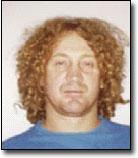LIHU’E — A 45-year-old Indiana man found not guilty by reason of insanity for threatening state employees and a judge in 1998 and 1999 had his conditional release revoked this week. Thomas K. Mentzer showed up before Fifth Circuit Court
LIHU’E — A 45-year-old Indiana man found not guilty by reason of insanity for threatening state employees and a judge in 1998 and 1999 had his conditional release revoked this week.
Thomas K. Mentzer showed up before Fifth Circuit Court Chief Judge George Masuoka Thursday, and admitted to not turning in reports on his psychiatric care and treatment.
He also said he turned himself in when he returned to the state in 2003.
Masuoka revoked Mentzer’s conditional release, and ordered Mentzer to be placed under the custody of officials with the state Department of Health for appropriate placement.
Mentzer was accused of threatening at least five workers with the state Department of Human Services, Child Protective Services, in 1998, and now-retired Fifth Circuit Court Judge Clifford Nakea in June 1999.
According to court records, in October 1999, Mentzer was acquitted of 13, first-degree, terroristic-threatening counts, and was committed to the Hawaii State Hospital in Kane’ohe on O’ahu.
In August 2000, Mentzer was released from the hospital subject to certain conditions, over strenuous objections from lawyers in the Kaua’i County Office of the Prosecuting Attorney.
Mentzer went home, to Fort Wayne, Ind., to his mother, court records show.
Also according to court records, Craig De Costa, now prosecuting attorney and then a deputy prosecuting attorney, wrote that Mentzer threatened state employees via telephone and by letter from at least two different states over a five-month period.
Those threats, according to De Costa, alleged a conspiracy by state employees to commit fraud and sell his daughter to pedophiles, and included references to mutilation, bullets, swords and sharp blades.
According to De Costa, Mentzer then threatened Nakea by calling him at home. Mentzer threatened to murder, torture and mutilate the judge because, Mentzer said, Nakea helped a state worker in the conspiracy to sell his daughter to pedophiles.
De Costa further wrote that Mentzer said he was going to get on a plane to Hawai’i to commit this murder, and pointed out that even the FBI could not stop him. Additionally, De Costa wrote that Mainland authorities had to “trick” Mentzer into meeting with him in order to arrest him.
Mentzer’s daughter was adopted, De Costa pointed out. However, he wrote that the adoption created a potential for more victims for Mentzer to lash out against.
De Costa pointed out in court records that there was no assurance that Mentzer’s mother would be able to control him.
The prosecutor wrote that there was no assurance that Mentzer will continue to take his medications, or show up for psychiatric treatment and care in Indiana.
De Costa also wrote that there was no assurance that state law-enforcement officials will be able to obtain an arrest warrant if Mentzer violated the terms and conditions of his release.
The prosecutor pointed out that Mentzer’s history of moving from state to state and making threats from new locations was ignored.
In October 2003, attorneys in the county prosecutor’s office filed a motion to revoke Mentzer’s release on the grounds that he violated the terms and conditions attached to it.
According to court records, Mentzer left Indiana two months before, and went to a homeless shelter on O’ahu. He was told by his mother to return to Indiana.
Also, according to court records, Mentzer’s pursuit of psychiatric care and treatment could not be verified, because he did not turn in quarterly reports.
Mentzer wrote letters to Masuoka. In one letter, Mentzer said that he was at the state hospital, and he hoped that Masuoka would approve his conditional release.
He also wrote that he was on medication for the first time, and that he was doing well on them.
Mentzer also wrote that he was extradited to Hawai’i after making long-distance phone calls.
He said that he had a job lined up when he returned to Indiana, and that the job was at a mental-health center within walking distance of his mom’s house. He also wrote that his family and son wanted him to return home.
In another letter, Mentzer wrote that he was bipolar. He said that losing his daughter brought out various psychoses and delusional states in his personality.
“I think my parental instincts have impaired a lot of my judgment,” wrote Mentzer.
“In my worry over my missing and kidnapped daughter I developed and formed all forms of hypothetical situations. For nearly two years myself or the biological relations requesting custody have no proof of my daughter even being alive,” wrote Mentzer.
In the letter, Mentzer said he thought his daughter was sold to members of the Japanese mafia to be used in child pornography.
Mentzer believed that his daughter was given drugs and murdered by the Japanese mafia, he wrote.
Mentzer also wrote that he thought a state worker was screening children from fractured families, and that those children were secretly sold into child prostitution, or to be used for medical experiments.
“The value of a white child to be sold to the Japanese mafia was very high,” wrote Mentzer.
He wrote that the alleged threats were made because his daughter was taken away from him. He said that the threats were addressed to those people whom he believed were involved in the kidnapping and black-marketing of his daughter.
“In my mind I wished to scare the criminal element away that kidnapped my precious daughter,” wrote Mentzer.


